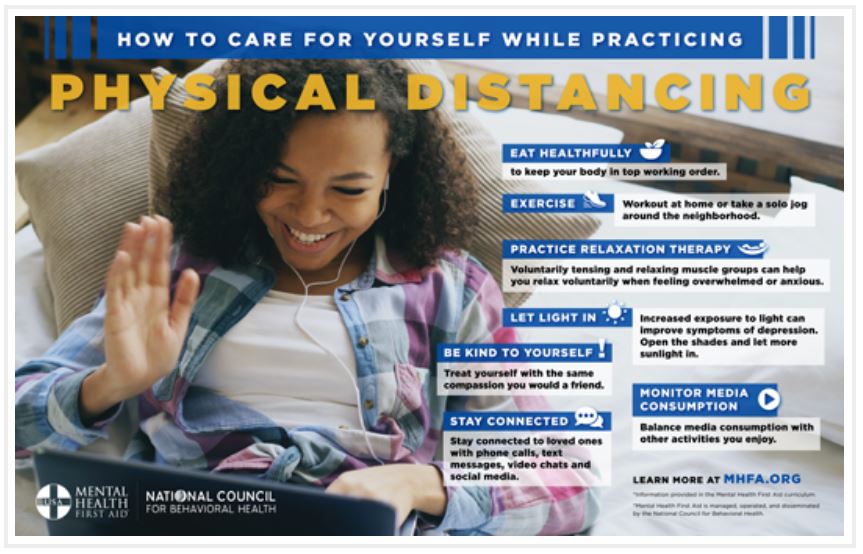May is Mental Health Month!
Mental Health First Aid USA (and others) shares tips for staying well ….

If you’re feeling stressed or nervous during these days of COVID-19, you’re not alone. Uncertainty and the sense of not being safe — not to mention physical distancing, round-the-clock news and empty grocery shelves — are stressful. What you’re feeling is common around the world.
We know you’re looking for ways to take care of yourself and #BeTheDifference. We’ve compiled these tips from the Mental Health First Aid curriculum to help you care for your own and your loved ones’ mental health.
If you or someone you care about feels overwhelmed with emotions like sadness, depression or anxiety, or like you want to harm yourself or others call 911.
You can also contact the Substance Abuse and Mental Health Services Administration’s (SAMHSA) Disaster Distress Helpline at 800-985-5990, the National Suicide Prevention Lifeline at 800-273-8255 or text MHFA to 741741 to talk to a Crisis Text Line counselor.
Additional information and resources from MHFA during this difficult time:
- How to Care for Yourself While Practicing Physical Distancing
- How Do I Know Someone is Experiencing Anxiety or Depression?
- How to Help Someone with Anxiety or Depression During COVID-19
- How to Support a Loved One Going Through a Tough Time During COVID-19
myStrength
During this stressful time, myStrength is here for you. Learn ways to manage extreme stress, get tips for parenting during challenging times, and find support to help you take care of your emotional health.*
*These COVID-19 and Mental Wellness resources are available to you and your friends and family at no cost through the end of June.
SAMHSA offers tips for Social Distancing, Quarantine, & Isolation during an Infectious Disease Outbreak
Includes:
- What is Social Distancing?
- What is Quarantine?
- What is Isolation?
- Are my reactions normal?
- How can I support myself during Social Distancing, Quarantine, And Isolation?
- Talking to your doctor
- Ways to cope and relax
Doing what Matters in Times of Stress
Doing What Matters in Times of Stress: An Illustrated Guide is a stress management guide for coping with adversity. The guide aims to equip people with practical skills to help cope with stress. A few minutes each day are enough to practice the self-help techniques. The guide can be used alone or with the accompanying audio exercises.
Informed by evidence and extensive field testing, the guide is for anyone who experiences stress, wherever they live and whatever their circumstances.
